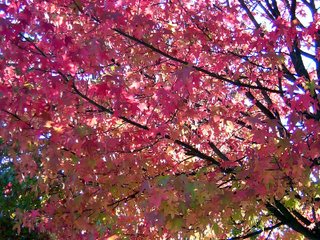 I'm not a poetry buff per se. I've always wanted to understand the whole artistry of the word placement and cadence and such but it's often lost on me. In an effort to "educate" myself a little bit I subscribed to Garrison Keillor's The Writers Almanac from American Public Radio. His little snippet of a radio program comes in your email box in text form, or you can click on the link to listen to it. Sometimes I just like to listen to his voice for a moment in the morning - the familiar, gentle sound of his speech a quiet comfort to start the day with.
I'm not a poetry buff per se. I've always wanted to understand the whole artistry of the word placement and cadence and such but it's often lost on me. In an effort to "educate" myself a little bit I subscribed to Garrison Keillor's The Writers Almanac from American Public Radio. His little snippet of a radio program comes in your email box in text form, or you can click on the link to listen to it. Sometimes I just like to listen to his voice for a moment in the morning - the familiar, gentle sound of his speech a quiet comfort to start the day with. Each day there is a little blurb about several well-known authors whose birthday falls on that date, plus a selected poem. Today is the birthday of e.e.cummings. I usually find myself drawn to his work. The poem that arrived today is no exception. Childlike, simple, with traditional rhyming patterns, it's just fun.
Poem: "87" by E.E. Cummings from 100 Selected Poems
87
o by the by
has anybody seen
little you-i
who stood on a green
hill and threw
his wish at blue
with a swoop and a dar
out flew his wish
(it dived like a fish
but it climbed like a dream)
throbbing like a heart
singing like a flame
blue took it my
far beyond far
and high beyond high
bluer took it your
but bluest took it our
away beyond where
what a wonderful thing
is the end of a string
(murmurs little you-i
as the hill becomes nil)
and will somebody tell
me why people let go
Garrison Keillor goes on to describe the man and his life - which made me smile and appreciate him all the more. So to borrow that little excerpt too . . .
"It's the birthday of poet E. E. Cummings (Edward Estlin Cummings), born in Cambridge, Massachusetts (1894). He was a man who wrote joyful, almost childlike poems about the beauty of nature and love, even though he was actually a conservative, irritable man who hated noisy modern inventions like vacuum cleaners and radios. He spent most of his life unhappy, struggling to pay the bills, ostracized for his unpopular political views.
He had published several books of poetry, including Tulips and Chimneys (1923), when he traveled to Russia in 1931, hoping to write about the superior society under the rule of communism. He was horrified at what he found. He saw no lovers, no one laughing, no one enjoying themselves. The theaters and museums were full of propaganda, and the people were scared to talk to each other in the street. Everyone was miserable.
When he got home, he wrote about the experience, comparing Russia to Dante's Inferno. Most of the publishers at the time were communists themselves, and they turned their backs on Cummings for criticizing communist Russia. Many magazines refused to publish his poetry or review his books. But the attacks only made him more stubborn. He said, "To be nobody-but-yourself -- in a world which is doing its best, night and day, to make you everybody else -- means to fight the hardest battle which any human being can fight; and never stop fighting."
He tried to write a script for a ballet, but it was never performed. He tried writing for the movies in Hollywood, but found that he spent all his time painting humming birds and sunsets instead of working on screenplays. He had to borrow money from his parents and his friends. He said, "I'm living so far beyond my income that we may almost be said to be living apart." A few years later, he decided to make some extra money by giving a series of lectures at Harvard University. Most lecturers spoke from behind a lectern, but he sat on the stage, read his poetry aloud, and talked about what it meant to him.
The faculty members were embarrassed by his earnestness, but the undergraduates adored him and came to his lectures in droves. Even though he suffered from terrible back pains, and had to wear a metal brace that he called an "iron maiden," he began traveling and giving readings at universities across the country. By the end of the 1950s he had become the most popular poet in America. He loved performing and loved the applause, and the last few years of his life were the happiest. He died on September 2, 1962."
His unusual way of mixing up words and yet painting such a pretty little picture is truly a gift. Like the beginning of one of his other poems, "anyone lived in a pretty how town":
anyone lived in a pretty how town
(with up so floating many bells down)
spring summer autumn winter
he sang his didn't he danced his did
Women and men(both little and small)
cared for anyone not at all
they sowed their isn't they reaped their same
sun moon stars rain
You almost want to sing it like a children's nursery rhyme, or dance around the room with it while making musical accompaniments with made up instruments like forks for castanets , or march in time to the lines, banging your imaginary drum.
No comments:
Post a Comment